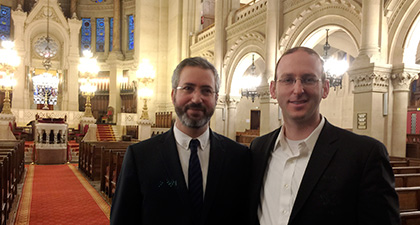MONTREAL — After a whirlwind two-day trip to Paris in the wake of the recent terrorist attacks there, Rabbi Adam Scheier is convinced that Canada, and particularly Quebec, must do more to help French Jews immigrate here if they wish to do so.
Rabbi Scheier, spiritual leader of Congregation Shaar Hashomayim and president of the interdenominational Montreal Board of Rabbis, said almost everyone he met in the Jewish community there knows someone who wants to leave France.
One of his goals was to gauge if they considered Canada an option.
“They are hearing a lot from Israel, and a little from the United States, but nothing from Canada,” he discovered. “They know Canada and Quebec, and its Jewish community, think it would be wonderful, but do not know it’s an option.”
Rabbi Scheier said the Canadian Jewish community should overcome any reluctance it has to appearing to be competing with Israel, which is actively and openly seeking olim in France, and do more to let French Jews know they are wanted here.
The Jews of France are a “besieged community,” he believes, and the community here has a “moral responsibility” to do what it can to welcome them.
“The reality is not every Jew is going to go to Israel,” he said. “Where one lives is a very personal decision.”
Because of common language and culture, Quebec would be a logical destination, and, of course, the Montreal community, which has been in decline for many years, would benefit from a replenishing of its numbers, he said.
In recent years, by observation, it would appear a significant number of French Jews have settled in Montreal, although no statistics are available.
Rabbi Scheier is in accord with his good friend Rabbi Shmuel Herzfeld of the Ohev Sholom National Synagogue in Washington, D.C. The latter is urging the U.S. to open its doors to French Jews, citing the tragic fate of many Jews who were unable to find a safe haven at the onset of World War II because North America was closed to them.
“There is momentum in the U.S. to reactivate the 1990 Lautenberg Amendment, which facilitated immigration for the beleaguered Jews of the Soviet Union,” said Rabbi Scheier. “A similar initiative should be undertaken in Canada, in particular in Quebec.”
He noted over the past five years the Shaar Hashomayim has welcomed a significant number of French immigrants, and French is now heard in that synagogue increasingly.
A few weeks ago, the shul held its first Sephardi Shabbat service – in French, and there was a lecture in French.
There are an estimated 550,000 Jews in France. A record number – nearly 7,000 – made aliyah in 2014.
Rabbi Scheier’s Paris trip from Jan. 13 to 15 was intended to show his and his congregation’s solidarity with the Jews of France. There he joined with his rebbe and teacher, Rabbi Avi Weiss and Rabba Sara Hurwitz, both of the Hebrew Institute of Riverdale in New York, and Rabbi Yehuda Sarna of New York University.
He met with rabbinical and lay leadership, and many ordinary Jews, He also led an emotional prayer vigil outside the Hyper Cacher kosher supermarket where four hostages were killed on Jan. 9.
Rabbi Scheier said he asked everyone he met whether they believed there is a future for Jews in France. The answers were not simple, given the community’s long history in and deep attachment to France.
“I spent time with former members of the Shaar who are now living in Paris and deeply conflicted about their future there.” He said.
Overall, he described the mood in the Paris Jewish community as sad and fearful. As a pharmacist he met told him, “Everyone I know is planning on leaving – it’s just too dangerous to be a Jew in France.”
Rabbi Scheier concludes that, “Paris is a city on edge, waiting for the next attack to emerge from the Islamic extremist population.”
Seeing about 15 soldiers carrying large guns as they guarded children at a Jewish kindergarten playing indoors because they were not permitted out in the schoolyard spoke volumes for Rabbi Scheier.
Howard Berger, co-director of Agence Ometz, the Federation CJA agency responsible for immigration services, said a meeting is scheduled for later this week to discuss the situation of French Jews.
Berger said Ometz makes no special outreach to the Jews of France, but welcomes them and assists them as it would any other Jews wishing to settle here.
The agency has seen a higher than average number of inquiries lately, noticeable even in the past 10 days, about immigrating from France. “That, of course, does not mean they will come here,” he said.
